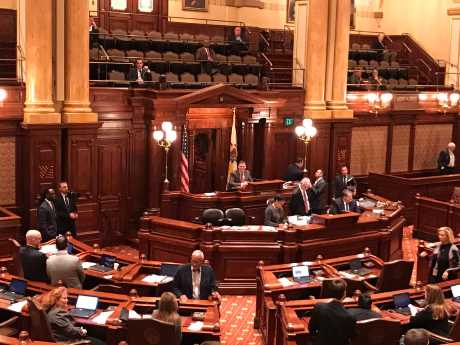Illinois has 11 nuclear reactors - all operated by Exelon - which produce nearly half the state's electricity and 90% of its zero-carbon energy. Three of those units - the single-unit Clinton and two units at Quad Cities - had been under threat of closure for economic reasons. Earlier this year Exelon announced that Clinton would close in June 2017 and Quad Cities one year later, if the state did not pass legislation supporting their continued operation.
Exelon and ComEd said the bill "levels the playing field with solar and wind energy" by recognising the zero-carbon energy produced in the state's nuclear facilities. It also maintained $1.2 billion in economic activity generated by the at-risk plants and prevented the estimated $10 billion increase in costs associated with higher carbon emissions had the plants closed, they said.
"This forward-looking energy policy levels the playing field and values all carbon-free energy equally, positions Illinois as a national leader in advancing clean energy, and will provide a major boost to the Illinois economy," Exelon president and CEO Chris Crane said. He encouraged the state's governor to "swiftly sign the legislation into law".
State governor Bruce Rauner, whose office has provided input into amendments to the bill, said the agreement aligned with his administration's guiding principles that any energy legislation should protect jobs, ratepayers and taxpayers. "This legislation will save thousands of jobs. It protects ratepayers, through guaranteed caps, from large rate increases in years to come. It also ensures taxpayers are not on the hook to keep the power plants open and online. We thank the rank-and-file legislators and stakeholders for their perseverance and commitment to seeing this through. This process shows that when all parties are willing to negotiate in good faith, we can find agreement and move our state forward," he said.
Maria Korsnick, the Nuclear Energy Institute’s chief operating officer, said approval of the legislation was a "tremendous" achievement. "This is a remarkable moment for the people of Illinois and for thousands of nuclear energy industry employees," she said. The bill is an "investment" in the state's clean energy future, she said.
Agneta Rising, director-general of the World Nuclear Association, said the bill would ensure continued operation of the Quad Cities and Clinton nuclear plants, providing clean and reliable electricity as part of a package of measures designed to boost a range of low-carbon energy technologies. "In the longer term we need markets to deliver the electricity mix that we need, without intervention. Markets should recognise the value of secure and reliable electricity supplies, as well as the environmental benefits of different forms of electricity generation," she said.
Illinois is the second US state to pass legislation explicitly recognising the contribution of nuclear power plants to clean energy efforts. In August, the New York Public Service Commission formally approved a Clean Energy Standard recognising the zero-carbon contribution of nuclear power plants and ensuring the continued operation of four that had been at risk of premature closure.
The bill was passed by both Illinois houses on the final day of their 2016 veto sessions. It must now be signed by Governor Rauner and is expected to take effect on 1 June 2017.
Researched and written
by World Nuclear News




